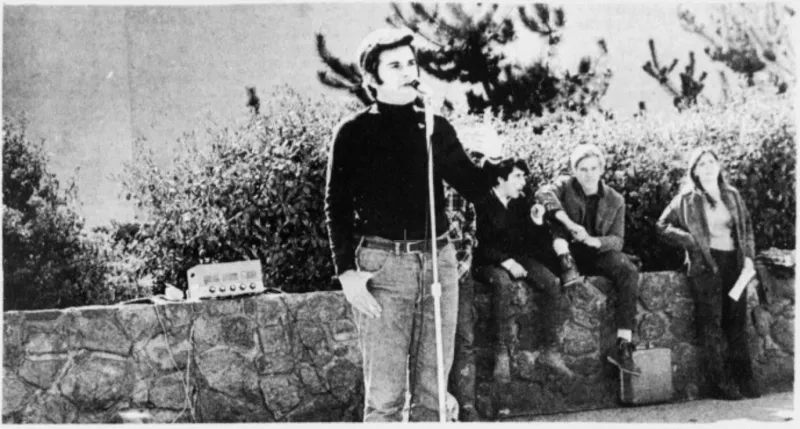Nearly 50 years after his controversial firing from Stanford, once-tenured English professor H. Bruce Franklin is returning to campus to present his memoir in a book talk on May 8 in the Terrace Room of Margaret Jacks Hall.
An anti-war activist and the first tenured professor to be dismissed from Stanford, Franklin was fired in 1972 for allegedly urging and inciting students and others to “disrupt University functions,” through two public speeches and a verbal protest to police who had ordered the dispersal of a crowd of students. The police order followed student occupation of Stanford’s Computation Center, which protesters had learned was running a government program called Gamut-H, linked to a Navy amphibious attack model, that was sponsored by the Stanford Research Institute.
Now 85 years old, Franklin said he was inspired to write his memoir because today’s young people “have no concept of what it’s like to live in a nation of peace … I’ve got to try to impart some of the knowledge that I’ve gained to young people.”
Today, most people “realize that we are now in a state of permanent war,” Franklin says. ”If people knew the history, I don’t think we would support these wars.”
A U.S. Air Force veteran who worked for the Strategic Air Command from 1956 to 1959, Franklin began to protest the Vietnam War after coming to the conclusion that he had been told “total lies” by his superiors. Franklin told The Daily last Friday that the things he’d been told did not align with what he had learned. His memoir combines his personal memories with an analysis of the war tactics of the United States and their implications today.
Franklin said that Stanford had been “trying to get rid of [him] for quite a while” and called the charges the Advisory Board had brought against him “pretty ridiculous.”
The Bruce Franklin Legal Fund wrote in The Daily in 1972 that the Board’s decision was based not on illegal acts but on the “uncomfortably heterodox” nature of Franklin’s political views.
Of the four charges brought against Franklin, one was not sustained, and another was thrown out in court in 1978. The American Civil Liberties Union (ACLU) executive board unanimously voted to support intervention in Franklin’s hearing, and an ACLU lawyer represented Franklin, urging damages to be paid as a result of his time out of work.
During his time at Stanford, Franklin participated in a number of anti-war actions and addresses, including speaking out in response to CIA contracts with the electrical engineering department, protesting explosive napalm facilities in Sunnyvale and Redwood City and taking part in the anti-war April Third Movement (A3M), which commemorated its 50th anniversary reunion this past weekend.
Franklin said that discoveries of Stanford’s involvement with the Vietnam War, from advanced weapons at Stanford Industrial Park to the Gamut-H program run at Stanford’s Computation Center to hardware research, “changed people’s understanding of the roles of a university in society” and “changed many people’s lives.”
Franklin said he was blacklisted for three years after the firing and that the Federal Bureau of Investigation targeted him to be “neutralized.” In 1975, he received a Rockefeller Foundation fellowship and began teaching at Rutgers-Newark, the nation’s most ethnically diverse research university, where he stayed until 2015.
Contact Elise Miller at elisejl ‘at’ stanford.edu.
